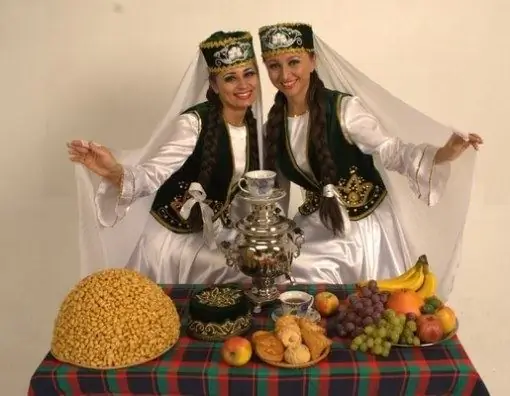- Author Antonio Harrison [email protected].
- Public 2023-12-16 07:44.
- Last modified 2025-01-22 21:44.
Every nation has its own customs, traditions that relate to literally all aspects of life. Including family and kinship relationships. These customs and traditions, coming from the depths of centuries, are one of the most characteristic features inherent in each ethnic group. How, for example, do the Tatars treat their relatives?

The main features of Tatar family etiquette
From time immemorial, the main rules governing Tatar family etiquette were: respect for the elders, hard work, and raising children. Until now, these rules are strictly observed in many Tatar families, especially religious ones, as well as those living in small towns and rural areas.
The greatest respect is enjoyed by grandfather (babay) and grandmother (ebi). During a joint meal, they sit in places of honor, they are addressed with emphasized politeness. In many traditional Tatar families, three generations of relatives still live under one roof, and it is grandparents who instill in the younger generation a love for national traditions and customs.
Tatars are very fond of children, attaching great importance to their birth and upbringing. It is not for nothing that they have a proverb: “A house with children is a bazaar, a house without children is a cemetery” (“Balaly is her bazaar, balasyz is her mazar”). But they try not to pamper them, to introduce them to work, although there are some exceptions, as in any nation. Children are taught from an early age that the basis of well-being is work, honesty and prudence. The elders often instill in them: "We are a hardworking people", "That Tatar who works a lot is successful."
An orphaned child must find shelter in the home of a relative. If there are no relatives, fellow villagers can adopt him.
The authority of the husband and father in a traditional Tatar family is indisputable. The wife and children are obliged to obey him, to be treated with respect. At the same time, a man is obliged to provide them with everything they need, take care of them, set a good example. The head of the family who neglects these rules is strongly condemned by relatives, friends and neighbors.
Relations between children in a traditional Tatar family
Respect for elders and obedience to them is instilled in children from the first years of life. This rule also applies to the relationship between siblings. Younger children are obliged to obey older brothers and sisters, even if their age difference is very small. The elders, in turn, are obliged to watch over the younger ones, take care and protect. This order is reflected in the peculiarities of the language: it is still customary for many Tatars to address their older brothers and sisters not by name, but with the help of special “vocative forms”. For example, "aby" ("abziy") is an older brother, "apa" is an older sister.






